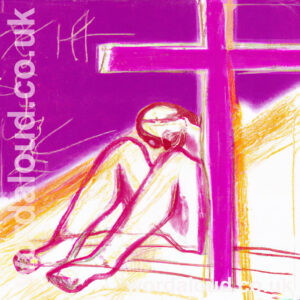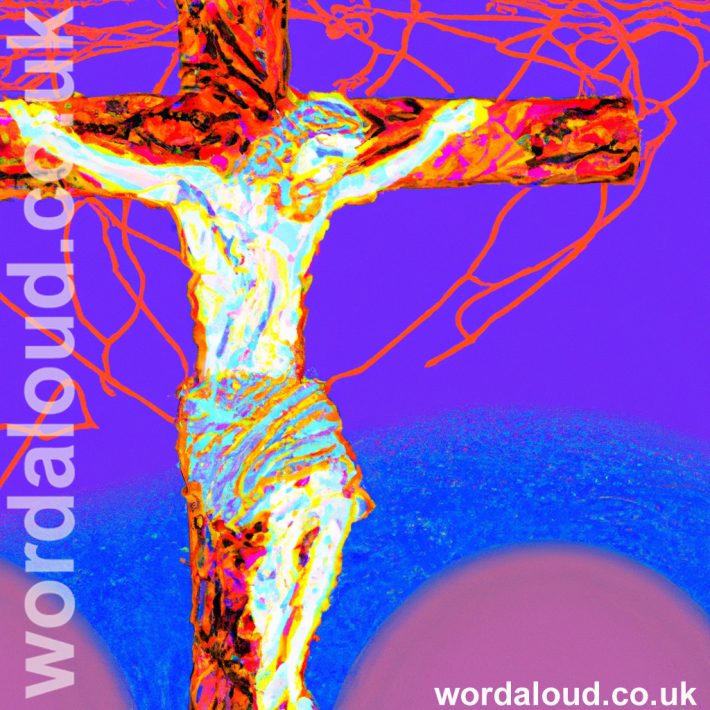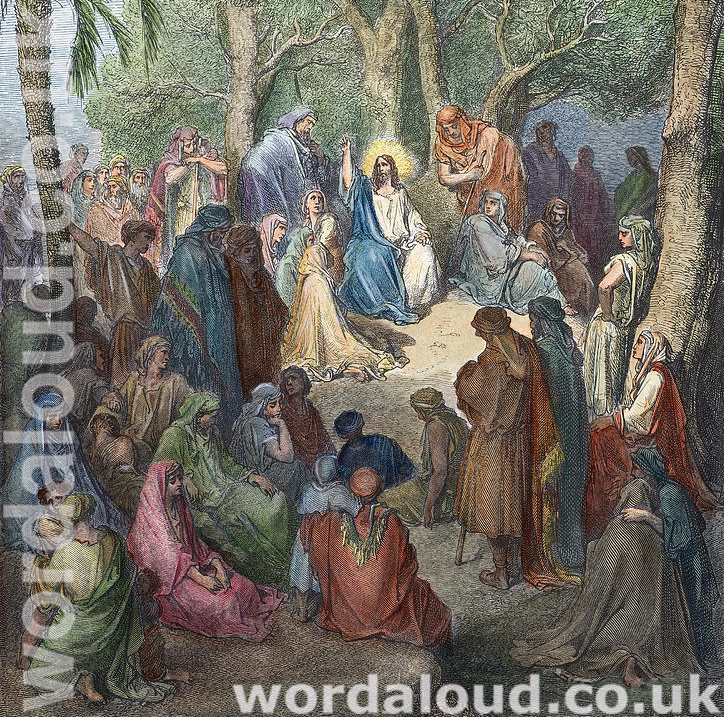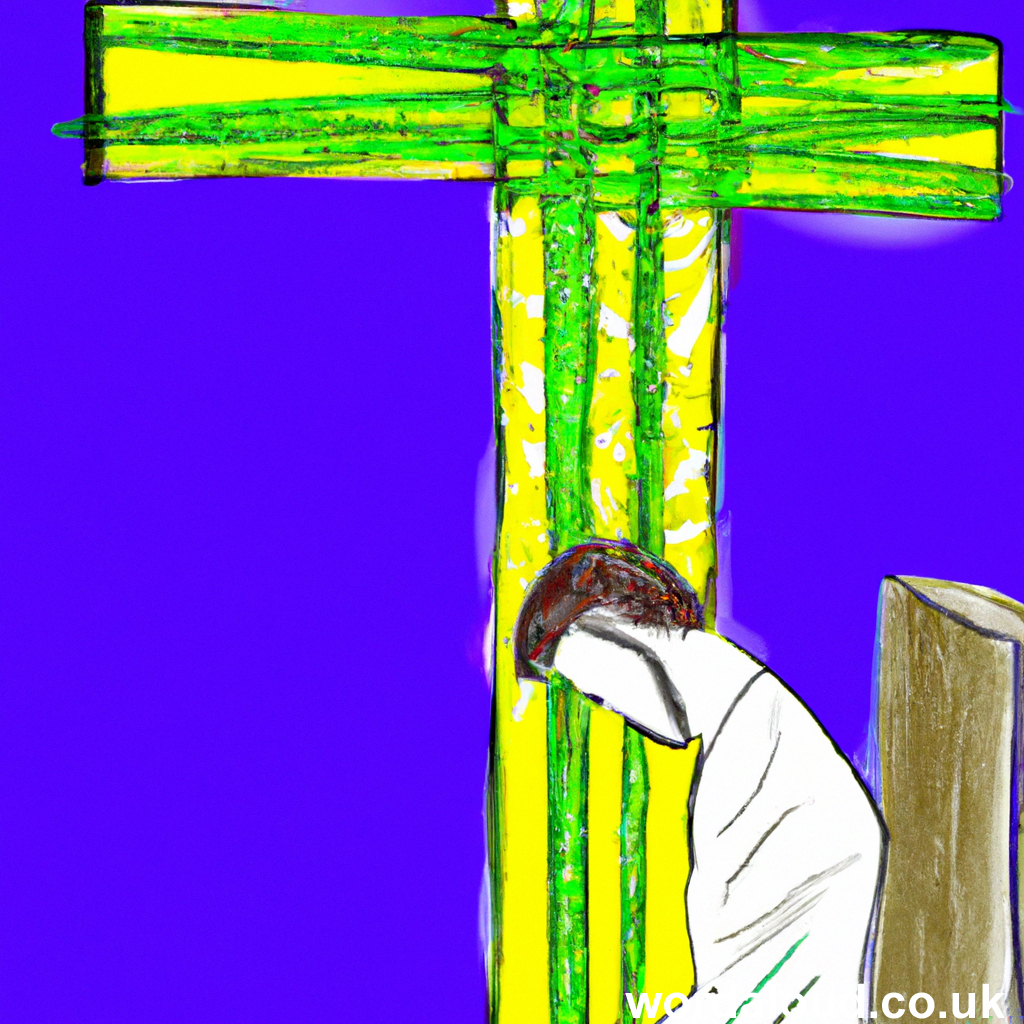Christian Art | King James Audio Bible | Easter KJV
King James Audio Bible KJV | Gospel Of Saint John, Chapter 20
What Is Easter? How Does Easter Relate To The Jewish Passover? When Is Easter?
Easter is the Christian holiday that celebrates the Resurrection of Jesus Christ. According to the Bible, Jesus was crucified on a Cross, died, and was buried. However, on the third day after his death, Jesus rose from the dead and appeared to his followers. Jesus is the Lord and conquered death.
The celebration of Easter has its roots in ancient religious traditions. It has evolved over time.
The date of Easter is closely related to the Jewish holiday of Passover. Passover is a celebration of the Israelites’ deliverance from slavery in ancient Egypt, as described in the book of Exodus in the Old Testament of the Bible. According to the story, God sent plagues upon the Egyptians as a way of persuading Pharaoh to let the Israelites go, and the final plague, the death of the firstborn, was only avoided if the Israelites sacrificed a lamb and smeared its blood on the doorframes of their homes. When the angel of death saw the blood, it passed over the Israelites’ homes, sparing the firstborn.
The story of Passover is remembered and celebrated by Jews each year during the holiday of Passover, which occurs in the spring. The exact date of Passover is determined using the lunar calendar, and it falls on the 15th day of the month of Nisan, which is the first month of the year in the lunar calendar.
Resurrection | Eternal Life In Jesus Christ
The Resurrection of Jesus Christ, as told in the Bible, is the belief Jesus rose from the dead after he was crucified and buried. It is a central doctrine of Christian faith and it is celebrated on Easter Sunday. (Every Sunday to a Christian is Easter!)
The Bible tells us that Jesus foresaw and foretold his own death on a Cross and Resurrection. In the Gospels, Jesus is recorded as speaking about his death and Resurrection on multiple occasions.
One of the most well-known passages about Jesus’ death and Resurrection is found in the Gospel of Saint John, where Jesus says, “I am the Resurrection and the life. Whoever believes in me, though he die, yet shall he live, and everyone who lives and believes in me shall never die” (John 11:25-26). In this passage, Jesus is saying that through his death and Resurrection, he has conquered death and offers eternal life to those who believe in him.
Other passages in the Gospels also mention Jesus’ foretelling of his death and Resurrection. For example, in the Gospel of Saint Matthew, Jesus says, “For as Jonah was three days and three nights in the belly of a great fish, so will the Son of Man be three days and three nights in the heart of the earth” (Matthew 12:40). This passage is often seen as a reference to Jesus’ death and Resurrection, as he was in the tomb for three days before rising from the dead.
Why Did Jesus Need To Die – And To Die So Cruelly?
According to the Christian faith, Jesus’ death was an essential part of God’s plan for the salvation of humanity. Christians believe that Jesus was sent by God to earth as a savior, and that his death on the Cross was a necessary sacrifice to atone for the sins of humanity.
The Christian belief is that all people have sinned and fallen short of God’s standards, and that this sin separates us from God. However, God loves humanity and wants to have a relationship with us, so he made a way for us to be reconciled to him. This reconciliation is achieved through Jesus’ death on the Cross, which is seen as a payment for the penalty of sin.
According to the Bible, Jesus willingly went to the Cross to die for the sins of humanity. He did this out of love for humanity and as an act of obedience to God. Christians believe that Jesus’ death on the Cross was a supreme act of love, and that through it, Jesus reconciled humanity to God and made it possible for people to have eternal life.
Jesus died so cruelly as a slave. God The Son became the lowest of the low – the lowest of our humanity – so that through the ultimate sacrifice he might save all of us – miserable sinners included.

![]()
This Is A Difficult Mystery
Yes, it is. The concept of Jesus’ death on the Cross and Resurrection is a difficult mystery to understand – or not – and reconcile.
What Was Crucifixion?
Crucifixion involved attaching a person’s body to a Cross or a stake, either by nails or rope, and leaving them to die. Crucifixion was a particularly cruel and painful method of execution. It was associated with slaves, bandits and the lowest of the low.
To be crucified, the victim’s hands were nailed or tied to the Crossbeam, and their feet were nailed or tied to the upright part of the Cross. The person being crucified would then be left hanging from the Cross, with their weight supported by the nails or ropes. This position would cause significant pain and discomfort, and it would make it difficult for the person to breathe.
Death from crucifixion would eventually result from asphyxiation.
How Did Jesus Celebrate The Passover?
Passover was an important holiday in the time of Jesus and is still celebrated by Jews today. According to the Old Testament of the Bible, Passover commemorates the deliverance of the Israelites from slavery in ancient Egypt. The story of the Israelites’ deliverance is told in the book of Exodus, which describes how God sent plagues upon the Egyptians as a way of persuading Pharaoh to let the Israelites go. The final plague, the death of the firstborn, was only avoided if the Israelites sacrificed a lamb and smeared its blood on the doorframes of their homes. When the angel of death saw the blood, it passed over the Israelites’ homes, sparing the firstborn.
In the time of Jesus, Passover was one of the most important holidays in the Jewish calendar, and it was observed with great reverence. During the Passover celebration, Jews would gather with their families and participate in a special meal called the Seder. The Seder included the reading of the story of the Israelites’ deliverance from slavery and the eating of special foods that symbolized different aspects of the story. For example, unleavened bread, called matzah, was eaten to represent the haste with which the Israelites left Egypt, and bitter herbs were eaten to remember the bitterness of slavery.
Passover was also an important holiday in the time of Jesus because it was one of the three pilgrimage festivals, along with Sukkot and Shavuot, when Jews from all over the country would come to Jerusalem to celebrate. During these festivals, the Second Temple in Jerusalem, which was the center of Jewish worship at the time, would be filled with worshippers. The Second Temple period, which lasted from 516 BCE to 70 CE, saw the development of many important Jewish texts, such as the Mishnah and the Talmud, which are still studied and revered by Jews today.
In the New Testament of the Bible, Jesus is recorded as having participated in the Passover celebration and as having instituted the Christian Eucharist during the Last Supper, which is seen as a fulfillment of the Passover ritual. The connection between Passover and the Christian Eucharist is one of the ways in which the Christian faith is rooted in Judaism.
In Relation To The Passover, Jesus Is The Lamb Of God?
In the New Testament, Jesus is referred to as the “Lamb of God” who takes away the sins of the world (John 1:29). This title is derived from the Jewish Passover tradition, in which a lamb was sacrificed as a symbol of the Israelites’ deliverance from slavery in Egypt. In the Christian tradition, Jesus is seen as the ultimate sacrifice for the sins of humanity, fulfilling the role of the Passover lamb. The concept of Jesus as the Lamb of God is central to the Christian belief in salvation through his death and Resurrection.
The idea of Jesus as the Lamb of God is rooted in the concept of sacrifice, which has been a part of many religions throughout history. In the Old Testament, the Israelites were commanded by God to offer animal sacrifices as a way of atoning for their sins and showing their devotion to God. One of the most well-known of these sacrifices was the Passover lamb, which was offered during the festival of Passover to commemorate the Israelites’ deliverance from slavery in Egypt.
According to the Biblical account, God commanded the Israelites to sacrifice a lamb and smear its blood on the doorposts of their homes as a sign of their obedience. When the angel of death passed through Egypt, it would “pass over” the homes of the Israelites, sparing the firstborn son of each household. This event is seen as a pivotal moment in the history of the Israelites and is remembered annually during the Passover celebration.
In the New Testament, Jesus is referred to as the “Lamb of God” who takes away the sins of the world (John 1:29). This title is seen as a reference to the Passover lamb, with Jesus fulfilling the role of the ultimate sacrifice for the sins of humanity. According to Christian belief, through his death and Resurrection, Jesus reconciled humanity with God and made it possible for people to have eternal life.
The concept of Jesus as the Lamb of God is central to the Christian faith and is depicted in many works of art and literature. It is often depicted in Christian art as a lamb with a halo or a Cross, representing Jesus’ role as both the savior of humanity and the embodiment of divine sacrifice.
In the book of Revelation, the apostle Saint John describes Jesus as the “Lamb that was slain” (Revelation 5:12). This description emphasizes the role of Jesus’ death as a sacrifice for the sins of the world. According to Christian belief, Jesus’ death on the Cross was a voluntary act of love and obedience to God’s will, made in order to redeem humanity from the consequences of sin.
The concept of Jesus as the Lamb of God is also closely tied to the Christian celebration of Easter, which commemorates the Resurrection of Jesus. In the traditional Easter liturgy, Jesus is often referred to as the “Lamb of God” and his Resurrection is seen as the ultimate triumph over death and sin.
Christian Easter, Jewish Passover
The Christian celebration of Easter has its deepest roots in the Jewish tradition and celebration of Passover. Passover is a Jewish holiday that commemorates the story of the Israelites’ liberation from slavery in ancient Egypt, as told in the Hebrew Bible. The celebration of Passover involves the reading of the Haggadah, a book that tells the story of the Israelites’ liberation, and the participation in a special meal called the Seder. The Seder includes the eating of symbolic foods, such as bitter herbs to symbolize the bitterness of slavery and matzo, unleavened bread, to symbolize the haste with which the Israelites left Egypt.
The Christian celebration of Easter is based on the belief that Jesus, who was a Jew, was crucified and resurrected on the third day after his death. According to the New Testament, Jesus’ Resurrection occurred around the time of the Jewish Passover, and many scholars believe that the early Christians saw Jesus’ Resurrection as a fulfillment of the Passover story.
As a result, the Christian celebration of Easter has many similarities to the Jewish celebration of Passover. Both holidays involve the reading of scriptures and the telling of stories, and both holidays are seen as a time of renewal and hope. The Christian celebration of Easter also includes the abstention from certain foods, such as meat and dairy products, and the participation in special church services and rituals.
Despite these similarities, the Christian celebration of Easter is also distinct from the Jewish celebration of Passover. The Christian celebration of Easter focuses on the belief in Jesus’ Resurrection, and the holiday is seen as a celebration of Jesus’ victory over death. The Jewish celebration of Passover, on the other hand, focuses on the story of the Israelites’ liberation from slavery in ancient Egypt, and the holiday is seen as a celebration of the Jews’ freedom and their relationship with God.
The Last Supper
The Last Supper celebrated by Jesus with his disciples was the Passover meal. Passover is a Jewish holiday that commemorates the story of the Israelites’ liberation from slavery in ancient Egypt, as told in the Hebrew Bible. During Passover, Jews remember the story of the Exodus and participate in special rituals and traditions, such as the reading of the Haggadah, a book that tells the story of the Israelites’ liberation from slavery.
The Last Supper, which is also known as the Passover meal, was held on the evening of Passover, and it was during this meal that Jesus instituted the rite of Holy Communion, in which bread and wine are consecrated and consumed as symbols of his body and blood. The connection between the Last Supper and the Passover meal is an important part of the Christian tradition, and helps to explain the significance of Easter in the Christian faith.
The Last Supper and the Passover meal are closely related, as both are rooted in the story of the Israelites’ liberation from slavery in ancient Egypt. The Passover meal is a central part of the Jewish tradition, and the Last Supper is a key event in the Christian tradition, serving as a bridge between the two faiths.
The Word Easter…
The word “Easter” is derived from the Old English word “Eastre,” which is believed to be related to the name of an Anglo-Saxon goddess of spring and fertility. The name “Eastre” is also thought to be related to the Latin word “Aurora,” which means “dawn” or “daybreak.”
The connection between the word “Easter” and the concept of spring and fertility likely reflects the fact that the holiday originally arose as a celebration of the rebirth of nature after the long, cold winter. In many cultures, springtime festivals have been associated with the renewal of life, and the celebration of Easter can be seen as a continuation of this ancient tradition.
In French, Easter is called “Pâques,” which is derived from the Latin word “Pascha,” meaning “Passover.” This reflects the close connection between the Christian celebration of Easter and the Jewish celebration of Passover.
In Spanish, Easter is called “Pascua,” which is also derived from the Latin word “Pascha.” In Italian, the holiday is called “Pasqua,” which has the same origin.
Other languages also have their own names for Easter. In Greek, the holiday is called “Πάσχα,” which is also derived from the word “Pascha.” In Russian, Easter is called “Пасха,” which is also derived from the same root. In Polish, the holiday is called “Wielkanoc,” which means “Great Night.”








